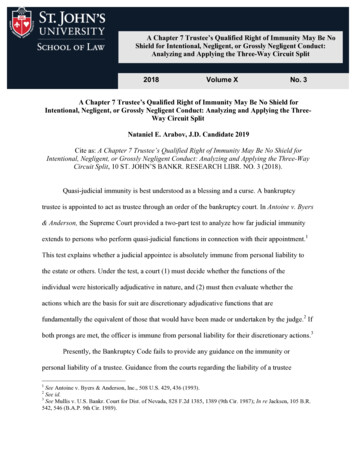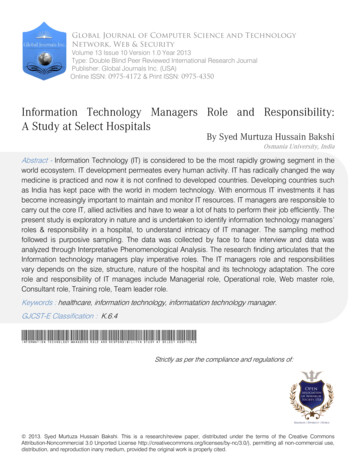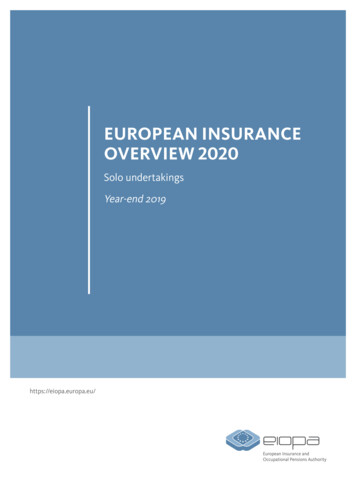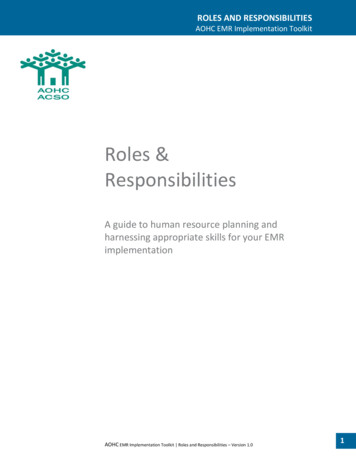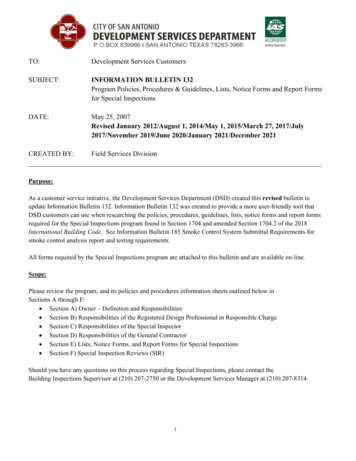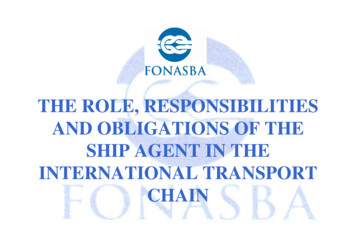
Transcription
THE ROLE, RESPONSIBILITIESAND OBLIGATIONS OF THESHIP AGENT IN THEINTERNATIONAL TRANSPORTCHAIN
A ship agent is any person or company that carries out thefunctions of an agent (see the following slide), irrespectiveof whether they are in business as a ship agent, or theyperform such functions as an adjunct to, or in conjunctionwith, other activities such as shipowning or operating,providing cargo handling or similar.FONASBA makes no distinction between those providingagency services as their main business activity or as a partof a portfolio of marine related services.
Acting as the local representative of the principal, theagent provides local knowledge and expertise and ensuresthat the principal’s requirements are performed with theutmost efficiency and despatch.Accordingly the agent requires to be fully conversant withall the appropriate regulations and requirements relating tothe port, area or sector in which they operate, to have awide range of relevant contacts and be sufficiently wellestablished and founded to be able to provide the level ofservice and support the principal needs.
The ship agent, as enshrined by international maritimeconvention, is primarily the servant of the master andowners of the vessel, the “principal”.In practice however, the agent can act for any of theparties involved in the voyage and in any capacity asagreed between the agent and his principal.
MAIN CATEGORIES OF SHIP AGENT:PORT AGENT: organises and coordinates the port call,acting on behalf of the owner or operator of the vessel.CARGO AGENT: solicits cargo on behalf of the owner,or operator, usually within a defined geographical areaOWNERS/CHARTERERS AGENT: acts for anotherparty that has an interest in the port call. The specificduties undertaken vary depending on the relationshipbetween the partiesOTHERS: as the principal may decide or require
THE PORT AGENTThe port agent is central to all trades and is responsiblefor organising, overseeing and coordinating all aspects ofthe port call, from booking berth allocations and servicesahead of the vessel’s arrival to finalising the accounts andother paperwork after the vessel has sailed.Functioning as the de facto port single window, the agentis the conduit for all information exchanged between thevessel and the shore.
The Role of the Port Agent in the Port CallTugs/PilotsStevedores/TerminalsOther SS/Road/RailPORTAGENTThe Master and s,NVOCC’sOtherContractors/SocialServices
THE PORT AGENT/contd.In order to operate effectively, the port agent is requiredto be fully conversant with the safety, commercial andstatutory requirements and regulations applicable to theport and ensure the vessel complies fully, in to ensure thatno delays are caused as a result of failure to meet itsobligations.The port agent will also require wide ranging andeffective contacts within the regulators, port operators andservice providers in order to ensure that the actions taken,and information provided, are correct and appropriate.
THE PORT AGENT/ contd When developing its unique Port Procedures Survey,FONASBA indentified more than 130 separate operationsthat a port agent may be required to undertake. Whilst it isunlikely that an agent will have to carry out all 130 operations in a single port call, the extent of the duties anddisciplines covered is indicative of the breadth ofknowledge and experience that the port agent is requiredto have and, importantly, to keep up to date.
THE CARGO AGENTOperating primarily in the liner and break bulk trades, the cargo (orliner) agent is responsible for securing cargo for the line or shipoperator. This requires the agent to be in regular contact with localshippers and be ready to provide information on vessel schedules,competitive rates and conditions of carriage. The agent may alsooffer or provide inland transportation, customs clearance and otherrelated services.The cargo agent may be independent and represent more than oneprincipal but in many cases the agent is tied to, or is often asubsidiary of, one specific principal.
THE OWNERS/CHARTERERS AGENTDepending on the circumstances of the port call, theremay be more than one agent attending the vessel.One party may decide that their best interests will berepresented by appointing their own independentrepresentative, rather than using the primary nominatedagent.The exact role and responsibilities of this second agent(and indeed the title under which they operate) will bedetermined on a case by case basis.
OTHER AGENCY APPOINTMENTSAn agent may be appointed to undertake other duties onbehalf of a principal and the extent of those duties may bespecific or general in nature as the principal requires.Such appointments often derive from unscheduledoccurrences such as port calls arising as a result of anemergency, vessel breakdowns or pollution incidents, oraction by statutory authorities such as customs orimmigration.
DUTIES OF THE AGENT / DELEGATEDAUTHORITY FROM THE PRINCIPALAt the time of initial appointment, the principal will issueinstructions to the agent detailing the services requiredand the limits of delegated authority. Within the limits ofthat authority, the agent is entitled to enter intoagreements or contracts, disburse funds and make otherarrangements that may bind the principal or incur costson their behalf.
“AS AGENTS ONLY”Assuming that the agent has not exceeded the delegatedauthority granted by the principal, the principal agrees toassume the obligations and to indemnify the agent for anycosts resulting from any contract or arrangements enteredinto by the agent on the principal’s behalf.The agent is entitled to benefit from the protectionsavailable to it under the above agreement but in order todo so must describe itself in all correspondence, writtenverbal and otherwise, “as agents only”
THE AGENCY FEEThe agent will charge the principal a fee based on thevolume of work undertaken. The fee is agreed throughnegotiation between the agent and the principal and isoften subject to competition from other agents.The precise form of the fee, for example a flat fee or onebased on the duties undertaken, can vary widely. The flatfee is common in port agency whilst the component basedfee is more normal for cargo agencies.
THE ROLE OF FONASBAEstablished in 1969, FONASBA is the global associationfor ship brokers and ship agents. With members in morethan 50 maritime nations, the Federation’s remit is to“promote and protect the professions of ship broker andship agent worldwide”, an obligation it dischargesthrough actions in relevant international and regionalbodies and organisations and by supporting its memberson matters of a national nature.
THE ROLE OF FONASBA contd/.FONASBA has consultative status with:the International Maritime Organisation, the UNConference on Trade and Development, the WorldCustoms Organisation and the European Commission.The Baltic Exchange, BIMCO, INTERTANKO and theShipbrokers’ Register are members of FONASBA and theFederation maintains close relations with Intercargo, aswell as European organisations representing shipowners,port authorities, terminal operators and others.
FONASBA Membership 2012AFRICA: Kenya, Mauritania, Mauritius, Morocco,Nigeria, Senegal, South Africa, TunisiaAMERICAS: Argentina, Brazil, Mexico, Peru, USAASIA/PACIFIC: Australia, China, India, Indonesia,Japan, the Philippines, Sri LankaEUROPE: Belgium, Bulgaria, Croatia, Cyprus,Denmark, Finland, France, Germany, GreatBritain, Greece, Hungary, Ireland, Italy, Malta,Montenegro, Netherlands, Norway, Poland,Portugal, Russia, Slovenia, Spain, Sweden, TurkeyMIDDLE EAST: Dubai, Israel, Jordan, Qatar, Syria,Yemen
FONASBA Membership 2012FONASBA Membership currently represents: 69% of global population (4.77 billion people) 71% of global GDP (US 52.78 trillion) 6 of the G7 countries (excl Canada) 7 of the G8 countries (excl. Canada) 17 of the G20 countries (excl. Saudi Arabia, SouthKorea & EU) 19 of the 27 EU countries (excl. Austria, CzechRep. Estonia, Latvia, Lithuania, Luxembourg,Romania and Slovakia) All 5 of the BRICS countries (Brazil, Russia,India, China and South Africa)
FONASBA Quality StandardIn October 2007, FONASBA unveiled its Quality Standardfor Ship Brokers and Agents. This is designed to set aninternationally recognised set of quality criteria by whichcompanies operating in the broking and agency industriescan be judged.Only companies that are members of FONASBA memberassociations can secure this standard.Currently FONASBA associations in19 countries (Argentina, Australia,Belgium, Brazil, Croatia, Cyprus,Denmark, Finland, Great Britain,Israel, Italy, Japan, Malta, Norway,Portugal, Slovenia, Spain, Swedenand the USA) are accredited to theStandard and over 280 companies areapproved.
Contact:For further information, please contact:Jonathan C. Williams FICS, General ManagerFONASBA, The Baltic Exchange, St. Mary AxeLONDON EC3A 8BHTel/Fax: 44 20 7623 3113E-mail: generalmanager@fonasba.comOr visit our website at: www.fonasba.com
MAIN CATEGORIES OF SHIP AGENT: PORT AGENT: organises and coordinates the port call, acting on behalf of the owner or operator of the vessel. CARGO AGENT: solicits cargo on behalf of the owner, or operator, usually within a defined geographical area



